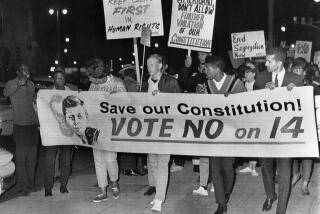The President Must Be a Civil Rights Leader : Talks on legislation derailed by White House intervention
If ever the art of skillful compromise were needed, now is the time.
Two White House aides recently intervened in high-level negotiations between civil rights groups and business leaders seeking a compromise 1991 civil rights bill. That intervention has been roundly denounced by some of the negotiators involved; they felt they were getting somewhere. The ugly suspicion is that the very prospect of success motivated the aides’ intervention: Right-wing groups are dead set against a reasonable compromise, and the White House sees broad political mileage in keeping the vile and bogus “quotas” issue alive in a politically motivated effort to stimulate white fears about reverse discrimination.
CLOSE TO A DEAL: Negotiations last year between the Administration and Congress almost succeeded in hammering out a civil rights bill. The compromise would have kept the burden of proof in job-discrimination cases with the employer, but would also have broadened the employer’s legal rights of defense. But last-minute recalcitrance by ideologues torpedoed progress.
Since December--actually in part at the suggestion of the Administration--business and civil-rights groups had been meeting quietly in an effort to draft a bill that protects people from job discrimination but avoids any obligation to establish hiring quotas. The negotiations were headed by members of the Business Roundtable, which represents more than 200 major U.S. corporations, and some well-known civil rights leaders.
No more. Pressure from White House chief of staff John H. Sununu and President’s counsel C. Boyden Gray discouraged and dispirited some business leaders. To make the matter sadder still, it appears that the negotiators had managed to narrow their differences, though some still remained, particularly on the issue of monetary compensation for proven employment bias.
The White House, for its part, insists that it has done nothing wrong, and indeed still encourages all parties to talk. But last Friday two angry civil-rights negotiators--former Urban League President Vernon E. Jordan Jr. and former U.S. Transportation Secretary William T. Coleman Jr.--went to the White House to complain about the unwanted Sununization. And some business leaders and moderate Republicans are known to be irked by the needless and big-footed White House interference.
THE QUOTA HANG-UP: Alleged quotas are the professed reason for the President’s veto last year of the proposed 1990 civil rights act--in spite of language in the bill that explicitly said that it did not encourage quotas.
Unfortunately, quota-mongering looks to be a very potent political weapon indeed. Sen. Jesse Helms employed it effectively last year in his successful reelection bid, and Administration strategists are know to believe that it can be used again and again to rally fearful white Americans around the GOP banner in next year’s presidential and congressional elections.
That may well be true, but the President must understand that he would risk the moral basis of his Presidency by consenting to practice a politics of such deviousness and deceit. The authority of the White House must be used to advance civil rights for all Americans, and to promote reasonable political compromise on the great issues of the day.
A new civil rights bill is needed to attenuate the effect of a series of Supreme Court rulings that make it harder for plaintiffs to win judgments in bias cases. Politicians on both sides of the aisle in Washington support such an effort, as do many members of the business community. All that is needed now is top-level leadership.
President Bush should call off his ideological pit bulls and endorse a compromise effort to achieve a civil rights bill this year.
More to Read
Get the L.A. Times Politics newsletter
Deeply reported insights into legislation, politics and policy from Sacramento, Washington and beyond. In your inbox three times per week.
You may occasionally receive promotional content from the Los Angeles Times.










